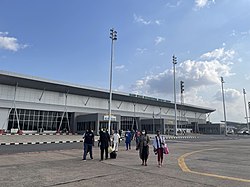Akanu Ibiam International Airport Enugu Airport | |||||||||||
|---|---|---|---|---|---|---|---|---|---|---|---|
 | |||||||||||
| Summary | |||||||||||
| Airport type | Public | ||||||||||
| Owner/Operator | Federal Airports Authority of Nigeria (FAAN) | ||||||||||
| Serves | Enugu, Awgu, Abakaliki, Awka, Umuahia; (Onitsha),( Nnewi),(Owerri), Aba, Okigwe, Nsukka, Orlu, Afikpo and Arochukwu, Parts of Cross River, Benue and Kogi States of Nigeria. Nigeria | ||||||||||
| Elevation AMSL | 466 ft / 142 m | ||||||||||
| Coordinates | 6°28′26″N7°33′40″E / 6.47389°N 7.56111°E | ||||||||||
| Map | |||||||||||
| Runways | |||||||||||
| |||||||||||
| Statistics (2015) | |||||||||||
| |||||||||||
Akanu Ibiam International Airport [4] ( IATA : ENU, ICAO : DNEN), also known as Enugu Airport, [1] is an international airport serving Enugu, [2] the capital city of Enugu State in Nigeria, and nearby cities, such as Abakaliki, Awka, Onitsha, Nnewi, Afikpo, Okigwe, Nsukka, Ugep, Orlu, Idah, Otukpo and Ogoja. It is named after the 20th-century politician Akanu Ibiam. The airport is strategically located at Emene, which is the primary industrial hub in Enugu.
Contents
It plays host to the Nigerian Air Force Base made up of the Ground Training Command, 405 Helicopter Combat Training Group, 541 Comms Group, 553 Base Services Group, and the International Helicopter Flying School. The airport is an international airport. [5] [6]
